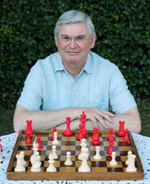Alan Fersht
Sir Alan Roy Fersht (born April 21, 1943 ) is a British chemist and former professor of organic chemistry at the University of Cambridge .
Life
Fersht completed both parts of the tripo at the University of Cambridge (equivalent to a bachelor's degree ) and, after completing a degree at Gonville and Caius College, Cambridge University, obtained a Ph.D. in 1968 from AJ Kirby. in organic chemistry . Fersht worked as a postdoctoral fellow with William Jencks at Brandeis University .
From 1969 Fersht worked as a research associate in the MRC Laboratory for Molecular Biology , before receiving a research professorship from the Royal Society and a professorship in biochemistry at Imperial College London in 1978 . In 1988 he moved to the University of Cambridge as Professor of Organic Chemistry and took over the management of the MRC Departments for Protein Engineering and Protein Function and Design. In 2010 he retired , but continues to research for the MRC (as of 2011).
Fersht is married and has two children. He is a passionate chess player and has written a book about Staunton figures (chess pieces). Fersht runs an extensive website on chess and chess pieces.
Act
Fersht is considered a pioneer in the field of structural and functional analysis of proteins and in the field of protein engineering . He was able to make significant contributions to the understanding of the mechanisms that lead to correct protein folding , including the chaperones .
With the application of site-directed mutagenesis , he improved the methods of protein engineering. This enabled him to determine the strength of electrostatic attraction in proteins, catalytic mechanisms using non-covalent binding energies (see Non-covalent organocatalysis ) and the ways in which an α-helix can be stabilized.
Fersht's group applies a variety of molecular biological , physical-chemical and organic-chemical methods (including protein engineering, DNA cloning and sequencing , mutagenesis, cell culture , gene and peptide synthesis , spectroscopy , multidimensional nuclear magnetic resonance spectroscopy and X-ray crystallography ) to To answer questions about protein folding and misfolding , drug discovery or the relationship between protein structure and activity in various diseases. Particular attention is paid to the role of mutations in the tumor suppressor p53 in the development of cancer and the development of new anti-cancer drugs that target the mutated p53.
Fersht was involved in the establishment of the following biotechnology companies: Cambridge Antibody Technology (1989, sold to AstraZeneca in 2006), Cambridge Drug Discovery (1997, sold to Millennium Pharmaceuticals in 2000) , Avidis (2000).
Awards (selection)
- 1980 Member of the European Molecular Biology Organization (EMBO)
- 1983 member of the Royal Society
- 1988 Foreign Honorary Member of the American Academy of Arts & Sciences .
- 1989 member of the Academia Europaea
- 1991 Gabor Medal
- 1993 Foreign member of the National Academy of Sciences
- 1996 Feldberg Foundation Prize
- 1998 Davy Medal
- 2003 Knight Bachelor
- 2008 International member of the American Philosophical Society
- 2008 Royal Medal
- 2009 Wilhelm Exner Medal
- 2020 Copley Medal
Fersht holds honorary doctorates from the following universities: Uppsala (1999), Brussels (1999), Weizmann Institute for Science (2004), Jerusalem (2006), Aarhus (2008).
Web links
- Entry about Sir Alan Fersht in the database of the Wilhelm Exner Medal Foundation .
- Professor Sir Alan Fersht FRS at the University of Cambridge (cam.ac.uk); Retrieved November 30, 2011
- Alan Fersht ( CV ) at the Medical Research Council (mrc-lmd.cam.ac.uk); Retrieved November 29, 2011
- Alan Fersht's chess site (britishchesssets.com); Retrieved November 29, 2011
Individual evidence
- ^ Biographical data, publications and academic family tree of Alan Roy Fersht at academictree.org, accessed on February 4, 2018.
- ↑ Find an EMBO Member at the European Molecular Biology Organization (embo.org); Retrieved November 30, 2011
- ^ Fellows of the Royal Society (royalsociety.org); Retrieved November 29, 2011.
- ↑ Book of Members 1780–2010 (PDF, 668 kB) of the American Academy of Arts & Sciences (amacad.org); Retrieved December 1, 2011.
- ^ Alan Fersht at the Academia Europaea (ae-info.org); Retrieved November 30, 2011.
- ^ Gabor Medal at the Royal Society (royalsociety.org); Retrieved November 29, 2011.
- ↑ Feldberg Foundation Prize Winners at the Feldberg Foundation (feldbergfoundation.org); Retrieved November 29, 2011.
- ^ Davy Medal at the Royal Society (royalsociety.org); Retrieved November 29, 2011.
- ↑ Chief scientific adviser knighted at news.bbc.co.uk; Retrieved December 1, 2011.
- ^ Professor Sir Alan Roy Fersht at the American Philosophical Society (amphilsoc.org); Retrieved August 8, 2012.
- ^ Royal Medal at the Royal Society (royalsociety.org); Retrieved November 29, 2011.
- ^ Honorary doctorates - Vrije Universiteit Brussel. In: vub.ac.be. Accessed March 28, 2018 (English).
| personal data | |
|---|---|
| SURNAME | Fersht, Alan |
| ALTERNATIVE NAMES | Fersht, Alan R .; Fersht Alan Roy |
| BRIEF DESCRIPTION | British chemist |
| DATE OF BIRTH | April 21, 1943 |
